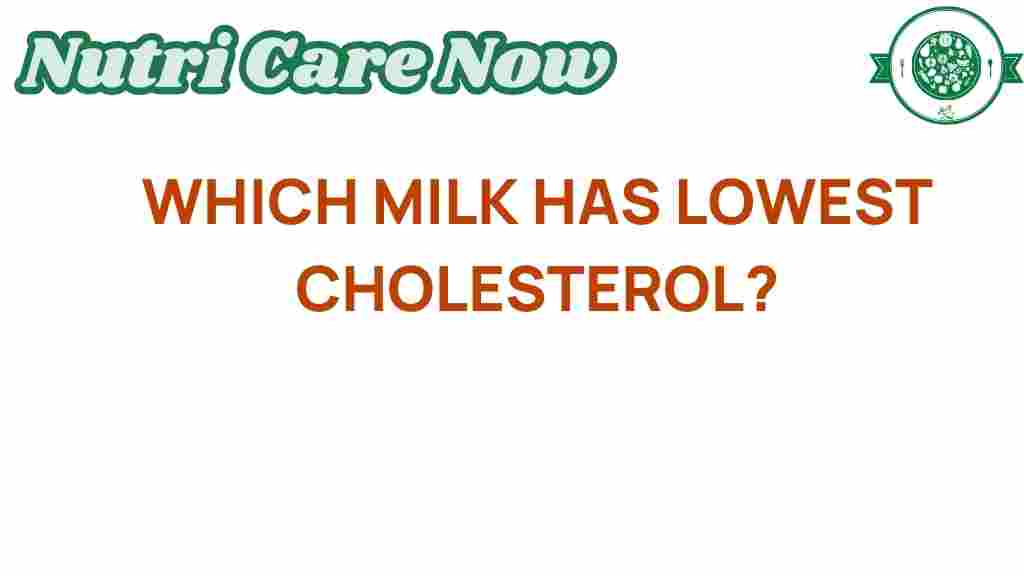Unveiling the Secret: Which Milk Has the Lowest Cholesterol?
When it comes to maintaining heart health, cholesterol levels play a vital role. Many individuals are becoming increasingly aware of how their dietary choices impact their cholesterol levels, leading to the pursuit of healthier alternatives like low-fat milk and plant-based milk. But with numerous milk types available, which one has the lowest cholesterol? In this article, we will explore various milk options, their cholesterol content, health benefits, and much more.
Understanding Cholesterol and Its Importance
Cholesterol is a waxy substance found in your blood, essential for building healthy cells. However, too much cholesterol can lead to health problems, particularly heart disease. There are two types of cholesterol:
- Low-Density Lipoprotein (LDL): Often referred to as “bad” cholesterol, high levels can lead to plaque buildup in arteries.
- High-Density Lipoprotein (HDL): Known as “good” cholesterol, it helps remove other forms of cholesterol from your bloodstream.
Maintaining a healthy balance between these two types is crucial for overall health. This is where dietary choices, especially milk types, come into play.
Cholesterol Levels in Different Milk Types
When considering cholesterol content, it’s essential to examine various milk types:
- Whole Milk: Contains about 24 mg of cholesterol per cup.
- 2% Milk: Has approximately 20 mg of cholesterol per cup.
- 1% Low-Fat Milk: Contains around 10 mg of cholesterol per cup.
- Skim Milk: Has the lowest cholesterol content, with about 5 mg per cup.
Among traditional dairy options, skim milk emerges as the clear winner for those seeking the lowest cholesterol content.
Dairy Alternatives: A Heart-Healthy Choice
In recent years, plant-based milk has gained popularity, not only for its lower cholesterol levels but also for its health benefits. Here are some common dairy alternatives and their cholesterol content:
- Almond Milk: Naturally cholesterol-free and low in calories.
- Soy Milk: Also cholesterol-free, rich in protein, and beneficial for heart health.
- Oat Milk: Growing in popularity, it contains no cholesterol and is high in fiber.
- Coconut Milk: While low in cholesterol, it is high in saturated fats, so moderation is key.
Plant-based milks are not only great for cholesterol management but also offer a variety of health benefits, including improved heart health and lower blood pressure.
Health Benefits of Low-Cholesterol Milk Choices
Choosing milk types with lower cholesterol can contribute to numerous health benefits:
- Weight Management: Low-fat and plant-based milks can help in maintaining a healthy weight.
- Heart Health: Lower cholesterol intake is crucial for preventing heart disease.
- Bone Health: Many milk alternatives are fortified with calcium and vitamin D.
- Digestive Health: Some plant-based milks contain fiber, promoting better digestion.
Integrating low-fat milk or plant-based options into your diet can significantly improve your overall health and well-being.
Making the Right Dietary Choices
When selecting the right milk for your health needs, consider the following:
- Read Labels: Always check the nutrition labels for cholesterol and saturated fat content.
- Fortified Options: Choose fortified milk alternatives to ensure you receive adequate vitamins and minerals.
- Personal Preferences: Taste and texture can vary widely among milk types, so try different options to find what you enjoy.
Incorporating a variety of milk types into your diet can help you manage cholesterol levels while enjoying the nutritional benefits they offer.
Step-by-Step Process: Choosing the Right Milk for You
To help you choose the right milk type, follow these steps:
- Assess Your Dietary Needs: Consider your cholesterol levels, dietary restrictions, and nutritional goals.
- Research Milk Types: Look into the cholesterol content and health benefits of each type of milk.
- Try Different Options: Experiment with various milk types to see which ones you enjoy most.
- Consult with a Healthcare Professional: If you have specific health concerns, it’s wise to discuss your options with a doctor or nutritionist.
By following this process, you can make informed choices that promote better heart health.
Troubleshooting Tips for Transitioning to Low-Cholesterol Milk
Transitioning to low-cholesterol milk types can come with challenges. Here are some tips to ease the process:
- Gradual Transition: Start by mixing low-fat or plant-based milk with your regular milk to adjust to the taste.
- Flavor Enhancements: Consider adding natural flavorings like vanilla or cocoa to improve the taste of plant-based milks.
- Use in Cooking: Substitute low-cholesterol milk in recipes to gradually incorporate it into your diet.
With a bit of patience, you can successfully transition to a healthier milk option without sacrificing enjoyment.
Conclusion
In conclusion, if you’re aiming for lower cholesterol levels, skim milk stands out among traditional dairy options, while plant-based milks like almond and soy milk also offer excellent alternatives with no cholesterol. The health benefits of these low-cholesterol milk types are significant, especially concerning heart health. By making informed dietary choices and experimenting with different milk types, you can enhance your nutrition while managing your cholesterol levels effectively.
For more information on heart health and dietary choices, check out this guide on cholesterol management. Embrace healthier milk options today and enjoy a happier, healthier lifestyle!
Remember, your health is ultimately a reflection of the choices you make, so choose wisely!
This article is in the category Health and created by NutriCareNow Team
